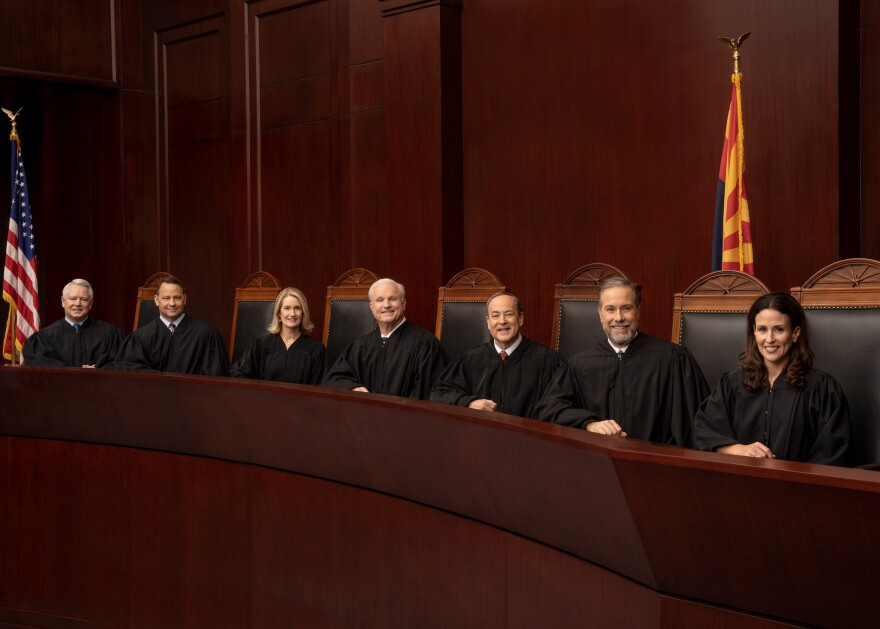By Howard Fischer, Capitol Media Services
PHOENIX -- Two Arizona Supreme Court justices have survived efforts to oust them over their votes on a controversial abortion measure.
Tallies on Wednesday showed Clint Bolick picking up support of more than 58% of those who voted on the question of whether he should get a new six-year term on the state's high court. Kathryn King polled slightly better at more than 59%.
But Arizonans apparently are unwilling to give up on their right to have their say in future elections. Fewer than one out of every four people supported Proposition 137 which would have given most judges the ability, once chosen, to serve without having to regularly face voters.
All judges in Arizona used to be elected directly by voters, the same as any other politician. But a 1974 constitutional amendment scrapped that for those on the Supreme Court, Court of Appeals and the bench in the largest counties, currently Maricopa, Pima, Pinal and Coconino.
Now vacancies are filled by the governor who must select from nominees screened by special panels. And those selected have to stand for reelection every four years -- six for appellate level judges -- on a retain-or-reject basis.
Campaigns against sitting judges has been rare. But all that changed when Bolick and King provided two of the four votes by the Supreme Court earlier this year, concluding that the decision by the U.S. Supreme Court to overturn Roe v. Wade meant Arizona could once again enforce an old -- but never repealed -- 1864 law making it a crime to perform an abortion except to save the life of the mother.
That 4-2 ruling never really took effect as state lawmakers subsequently voted to repeal the old law, leaving in its place a 15-week ban. And voters separately decided Tuesday to enshrine a right to abortion in the Arizona Constitution.
But that original ruling left many abortion rights supporters bitter and angry -- and bound and determine to oust the pair.
There also was a political factor behind the effort to oust Bolick and King.
Any vacancy on the state's high court would be filled by Hobbs, who already is getting ready to find a replacement for Justice Robert Brutinel who is retiring. Two more picks by the Democratic governor -- and Chief Justice Ann Scott Timmer who voted against reinstating the 1864 abortion law considered a relative moderate despite her Republican affiliation -- could have paved the way for a sharp shift in the political tilt of the seven-member court.
That possibility did not escape Randy Kendrick, the wife of Arizona Diamondbacks owner Ken Kendrick who has contributed to Republican candidates in the past.
She formed the Judicial Independence Defense PAC specifically to keep Bolick and King on the high court.
But Kendrick, in a fundraising letter, made it clear this is about politics, saying "liberal groups'' already have succeeded in clinching the posts of governor, secretary of state and attorney general for the Democrats. And she pointed out that Republicans hold the majority in the state House and Senate by only one seat in each chamber.
"These same groups have now set their sights on the Arizona Supreme Court,'' Kendrick wrote.
She also put $125,000 of her own money, exceeded only by Pennsylvanian Jeff Yass at
$200,000, with total donations at $530,000.
The campaign was pretty much one-sided. Promised spending by Progress Arizona and Planned Parenthood Votes to oust the two justices never really materialized. And a group known as Protect Abortion Rights, No Retention Bolick and King raised less than $17,500.
But the desire of a majority of Arizonans to keep the pair on the bench did not translate into a willingness to give up the right to decide whether to remove other judges in the future.
That was the basis of Proposition 137.
The idea originally came from the Arizona Judges Association. Lobbyist Jonathan Paton told lawmakers it made no sense to crowd the ballot every two years with a long list of judges given that virtually all are retained.
What the judges proposed is altering the Arizona Constitution to say that the only judges who have to stand for reelection are those who have run into some kind of trouble, like a personal bankruptcy or a felony conviction. Any judge whose performance was rated not acceptable by the Commission on Judicial Performance Review also would have to get the consent of voters for a new term.
Everyone else, however, could serve if they wanted until mandatory retirement age of 70.
That idea drew the support of Arizonans for an Independent Judiciary.
Attorney Tim Berg who chaired the bipartisan organization of attorneys said its concern was to protect judges from being targeted at election time for what might be an unpopular decision. It raised about $56,700 to fight Prop 137.
The ballot measure also drew opposition from some conservative interests.
They wanted to preserve the ability of voters to get rid of what they see as activists judges. And some even sought removal of judges who had ruled against Kari Lake in her ill-fated legal arguments that she, and not Hobbs, was elected governor in 2022.
But the issue was even more complicated.
In putting Prop 137 on the ballot, Republican lawmakers added a last-minute provision to make it retroactive to before the election. That drew a skeptical reception because it would have guaranteed that every judge up for election this year would remain on the bench, regardless of whether voters decided they should be retired.
On X and Threads: @azcapmedia








